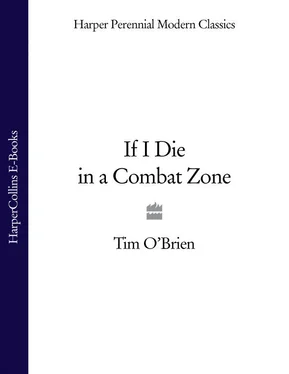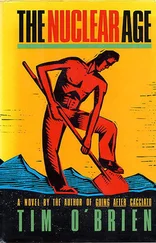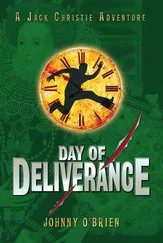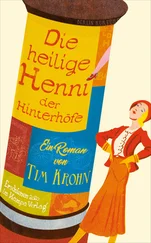The war and my person seemed like twins as I went around the town’s lake. Twins grafted together and forever together, as if a separation would kill them both.
The thought made me angry.
In the basement of my house I found some scraps of cardboard and paper. With devilish flair, I printed obscene words on them, declaring my intention to have no part of Vietnam. With a delightful viciousness, a secret will, I declared the war evil, the draft board evil, the town evil in its lethargic acceptance of it all. For many minutes, making up the signs, making up my mind, I was outside the town. I was outside the law, all my old ties to my loves and family broken by the old crayon in my hand. I imagined strutting up and down the sidewalks outside the depot, the bus waiting and the driver blaring his horn, the Daily Globe photographer trying to push me into line with the other draftees, the frantic telephone calls, my head buzzing at the deed.
On the cardboard, my strokes of bright red were big and ferocious looking. The language was clear and certain and burned with a hard, defiant, criminal, blasphemous sound. I tried reading it aloud.
Later in the evening I tore the signs into pieces and put the shreds in the garbage can outside, clanging the grey cover down and trapping the messages inside. I went back into the basement. I slipped the crayons into their box, the same stubs of colour I’d used a long time before to chalk in reds and greens on Roy Rogers’s cowboy boots.
I’d never been a demonstrator, except in the loose sense. True, I’d taken a stand in the school newspaper on the war, trying to show why it seemed wrong. But, mostly, I’d just listened.
‘No war is worth losing your life for,’ a college acquaintance used to argue. ‘The issue isn’t a moral one. It’s a matter of efficiency: what’s the most efficient way to stay alive when your nation is at war? That’s the issue.’
But others argued that no war is worth losing your country for, and when asked about the case when a country fights a wrong war, those people just shrugged.
Most of my college friends found easy paths away from the problem, all to their credit. Deferments for this and that. Letters from doctors or chaplains. It was hard to find people who had to think much about the problem. Counsel came from two main quarters, pacifists and veterans of foreign wars.
But neither camp had much to offer. It wasn’t a matter of peace, as the pacifists argued, but rather a matter of when and when not to join others in making war. And it wasn’t a matter of listening to an ex-lieutenant colonel talk about serving in a right war, when the question was whether to serve in what seemed a wrong one.
On 13 August, I went to the bus depot. A Worthington Daily Globe photographer took my picture standing by a rail fence with four other draftees.
Then the bus took us through corn fields, to little towns along the way – Lismore and Rushmore and Adrian – where other recruits came aboard. With some of the tough guys drinking beer and howling in the back seats, brandishing their empty cans and calling one another ‘scum’ and ‘trainee’ and ‘GI Joe’, with all this noise and hearty farewelling, we went to Sioux Falls. We spent the night in a YMCA. I went out alone for a beer, drank it in a corner booth, then I bought a book and read it in my room.
By noon the next day our hands were in the air, even the tough guys. We recited the proper words, some of us loudly and daringly and others in bewilderment. It was a brightly lighted room, wood panelled. A flag gave the place the right colours, there was some smoke in the air. We said the words, and we were soldiers.
I’d never been much of a fighter. I was afraid of bullies. Their ripe muscles made me angry: a frustrated anger. Still, I deferred to no one. Positively lorded myself over inferiors. And on top of that was the matter of conscience and conviction, uncertain and surface-deep but pure none the less: I was a confirmed liberal, not a pacifist; but I would have cast my ballot to end the Vietnam war immediately, I would have voted for Eugene McCarthy, hoping he would make peace. I was not soldier material, that was certain.
But I submitted. All the personal history, all the midnight conversations and books and beliefs and learning, were crumpled by abstention, extinguished by forfeiture, for lack of oxygen, by a sort of sleepwalking default. It was no decision, no chain of ideas or reasons, that steered me into the war.
It was an intellectual and physical stand-off, and I did not have the energy to see it to an end. I did not want to be a soldier, not even an observer to war. But neither did I want to upset a peculiar balance between the order I knew, the people I knew, and my own private world. It was not that I valued that order. But I feared its opposite, inevitable chaos, censure, embarrassment, the end of everything that had happened in my life, the end of it all.
And the stand-off is still there. I would wish this book could take the form of a plea for everlasting peace, a plea from one who knows, from one who’s been there and come back, an old soldier looking back at a dying war.
That would be good. It would be fine to integrate it all to persuade my younger brother and perhaps some others to say no to wars and other battles.
Or it would be fine to confirm the odd beliefs about war: it’s horrible, but it’s a crucible of men and events and, in the end, it makes more of a man out of you.
But, still, none of these notions seems right. Men are killed, dead human beings are heavy and awkward to carry, things smell different in Vietnam, soldiers are afraid and often brave, drill sergeants are boors, some men think the war is proper and just and others don’t and most don’t care. Is that the stuff for a morality lesson, even for a theme?
Do dreams offer lessons? Do nightmares have themes, do we awaken and analyse them and live our lives and advise others as a result? Can the foot soldier teach anything important about war, merely for having been there? I think not. He can tell war stories.
‘Incoming,’ the lieutenant shouted.
We dived for a foxhole. I was first in, the ground taking care of my belly, then the lieutenant and some others were in, stacked on my back.
Grenades burst around the perimeter, a few rifle shots.
‘Wow, like a sandwich,’ I said. ‘Just stay where you are.’
‘Yep, we’re nothing but sandbags for O’Brien,’ Mad Mark said, peering up to watch the explosions go off.
‘Protect the College Joe,’ Barney said, nestled down by my feet.
It didn’t last long.
A blond-headed soldier ran over when the shooting ended. ‘Jesus, I got me a hunk of grenade shrapnel in my fuckin’ hand,’ he said. He sucked the wound. It didn’t seem bad.
Mad Mark inspected the cut under a flashlight. ‘Will it kill you before morning?’
‘Nope, I guess not. Have to get a tetanus shot, I suppose. Christ, those tetanus shots hurt don’t they? I don’t want a fuckin’ tetanus shot.’
As it turned out, the first fight had not been a fire fight. The blond soldier and a few others had been bored. Bored all day. Bored that night. So they’d synchronized watches, set a time, agreed to toss hand grenades outside our little perimeter at 2200 sharp, and when 2200 came, they did it, staging the battle. They shouted and squealed and fired their weapons and threw hand grenades and had a good time, making noise, scaring hell out of everyone. Something to talk about in the morning.
‘Great little spat,’ they said the next day, slyly.
‘Great?’ I couldn’t believe it.
‘Ah, you know. Little action livens up everything, right? Gets the ol’ blood boiling.’ ‘You crazy?’ ‘Mad as a hatter.’
Читать дальше












